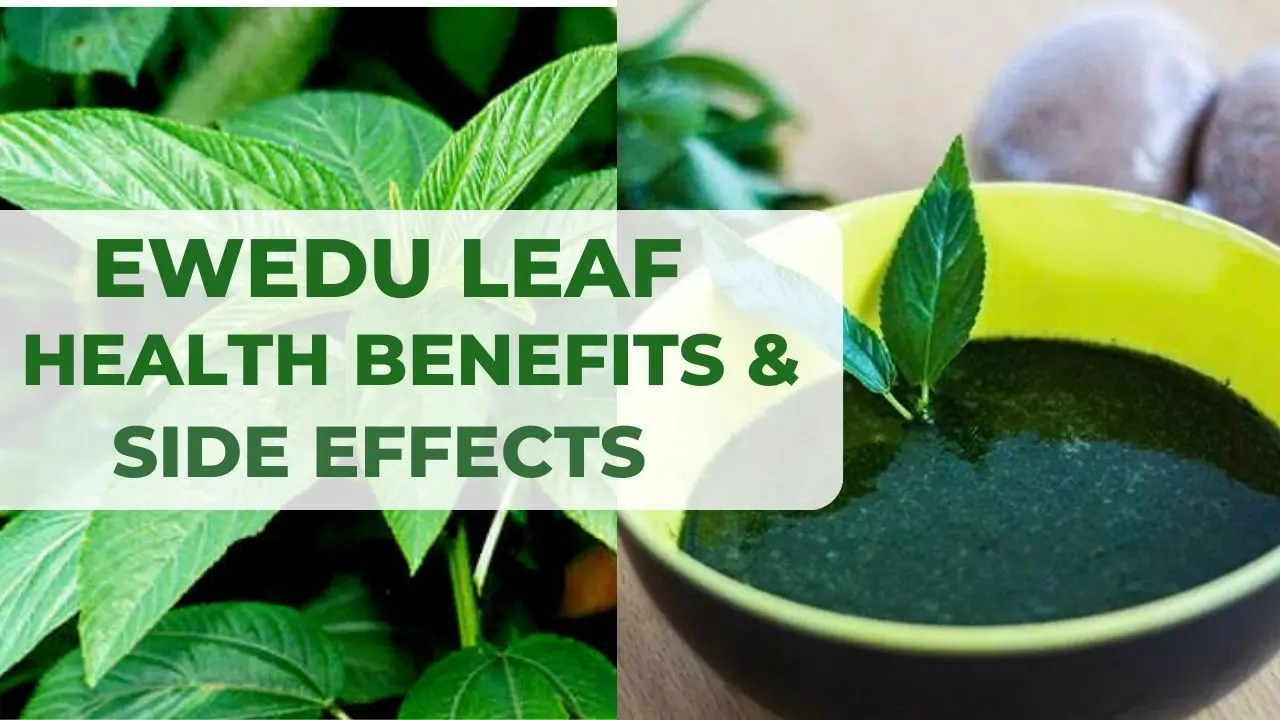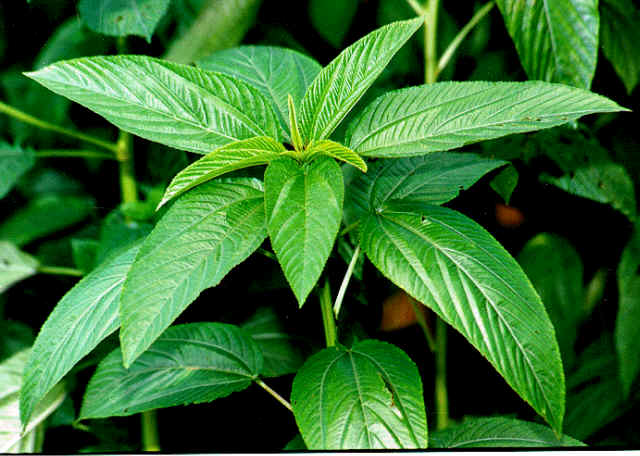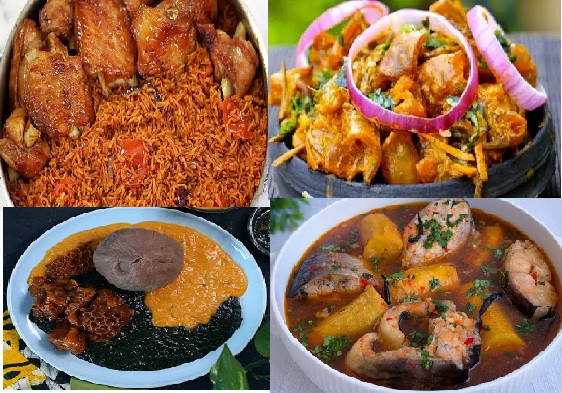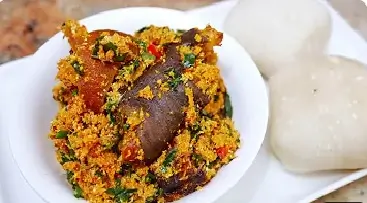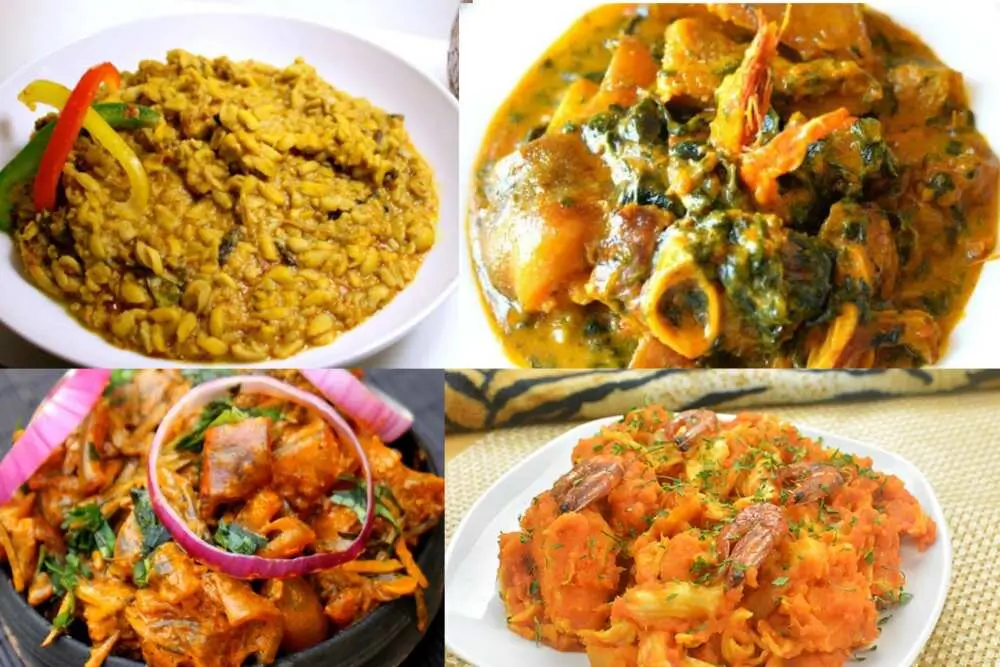
Ewedu leaf is a green, leafy vegetable popular in West Africa, especially among the Yoruba people of Nigeria. It is also known as jute leaf, molokhia, or rau day in other regions of the world. Ewedu leaf has a slimy texture when cooked, similar to okra, and is often used as the main ingredient of Ewedu Soup in Yoruba land.
Ewedu leaf is delicious, nutritious, and has many health benefits. However, it also has some potential side effects and precautions you should know before consuming it.
This article will explore the origin, nutrition facts, health benefits, and side effects of ewedu leaf. Without further ado, let’s begin!
What is Ewedu Leaf?
Ewedu leaf is the common name for the leaves of Corchorus olitorius, which belongs to the family Malvaceae. It is also known by various names such as jute leaf, molokhia, rau day, saluyot, krinkrin, bush okra, lalo, and Jew’s mallow. Ewedu leaf is native to tropical and subtropical regions of Africa and Asia. It has been cultivated for thousands of years as a food crop and a source of fibre for making jute.
The ancient Egyptians also used Ewedu leaf as a medicinal herb and a staple food. Today, Ewedu leaf is widely grown and consumed in many parts of the world, especially in West Africa, the Middle East, East Africa, Southeast Asia, and the Caribbean.
One of the most popular ways to prepare Ewedu leaves is to make Ewedu soup, a traditional soup among the Yoruba people of Nigeria. Ewedu soup is made by blending fresh or frozen Ewedu leaves with water and seasoning with salt, locust beans (iru), crayfish, and potash (optional). The soup is then cooked until it reaches a smooth consistency. Ewedu soup is usually served with stewed beans (gbegiri), meat or fish stew, and a solid meal like amala (yam flour), fufu (cassava flour), eba (garri), or pounded yam.
Another popular dish that uses Ewedu leaf is Molokhia, or Mulukhiyah, a typical dish in Egypt and other Middle Eastern countries. Molokhia is made by cooking chopped fresh or dried Ewedu leaves with chicken broth, garlic, coriander, salt, pepper, and lemon juice. The dish is then served with rice, chicken pieces, and other choice foods.
Ewedu Leaf Nutritional Facts
Below are some of the nutritional facts of Ewedu (Jute Leaf):
Calories and macronutrients
Ewedu leaf is low in calories but high in protein and fibre. According to the USDA, one cup (87 grammes) of cooked ewedu leaf provides the following nutrition facts:
- Calories: 32
- Protein: 3 grammes
- Fat: 0.2 grammes
- Carbohydrates: 6 grammes
- Fiber: 2 grams
- Sugar: 0.4 grammes
Vitamins and minerals
Ewedu leaf is also rich in vitamins and minerals, especially vitamin A, vitamin C, iron, calcium, and magnesium. According to Healthline, one cup (87 grams) of cooked Ewedu leaf provides the following percentages of the daily value (DV) for adults:
- Vitamin A: 25%
- Vitamin C: 32%
- Vitamin B2 (riboflavin): 13%
- Folate: 23%
- Iron: 15%
- Calcium: 14%
- Magnesium: 13%
- Potassium: 10%
Health Benefits of Ewedu Leaf
Ewedu leaf has been used for centuries as a medicinal herb in Ayurveda and other traditional systems of medicine. Some of the health benefits of Ewedu leaf are:
Ewedu Leaf Benefits for Diabetes
Ewedu leaf may help reduce inflammation due to its omega-3 fatty acids and antioxidants. Omega-3 fatty acids can regulate the production of inflammatory molecules and reduce the risk of chronic diseases such as cardiovascular disease, diabetes, and arthritis. Antioxidants can safeguard cells against oxidative stress and prevent tissue damage and inflammation.
Ewedu Leaf Benefits for Cancer Prevention
Ewedu leaf is a good source of vitamins C and A, flavonoids, phenolic acids, and tannins. Antioxidants can counteract free radicals and prevent oxidative damage to cells and DNA. Oxidative stress is associated with ageing and various diseases such as cancer, diabetes, etc.
Ewedu Leaf Benefits for Digestion
Ewedu leaf can also be of benefit to your digestive health, as it is rich in fibre and mucilage. Fibre can promote bowel movements, prevent constipation, feed the beneficial bacteria in the gut, and improve gut health. Mucilage is a soluble Fibre that forms a gel-like substance when mixed with water. Mucilage can coat and protect the lining of the stomach and intestines from irritation and ulcers. It can also lower cholesterol and blood sugar levels by slowing digestion and absorption.
Ewedu Leaf Benefits for Skin and Hair
Skin and hair health: Ewedu leaf can also improve skin and hair health, as it contains vitamins A and C, omega-3 fatty acids, and antioxidants. Vitamin A is essential for skin cell growth and differentiation. It can also protect the skin from sun damage and infections. Vitamin C is necessary for collagen synthesis, the skin’s primary structural protein. It can also enhance wound healing and prevent scurvy.
Ewedu Leaf Benefits for Weight Loss
This low-calorie vegetable is rich in fibre and water, making it an excellent food choice for weight loss. The fibre in Ewedu helps to improve digestion and metabolism, which are essential for burning fat and calories. Additionally, Ewedu leaf contains vitamins B and C, magnesium, and omega-3 fatty acids, which can regulate blood sugar levels and prevent cravings.
Ewedu Leaf Benefits for Blood Sugar
Ewedu leaf can help lower blood sugar levels and prevent diabetes by improving insulin sensitivity and glucose uptake in the cells. Ewedu leaf is rich in antioxidants, such as vitamin C and beta-carotene, which can protect the pancreas and other organs from oxidative stress and inflammation caused by high blood sugar. Ewedu leaf also contains magnesium, which can help regulate blood pressure and prevent complications of diabetes, such as cardiovascular disease and kidney damage.
Ewedu Leaf Benefits for the Immune System
Ewedu leaf can help boost the immune system and fight infections by enhancing the production and function of white blood cells, such as lymphocytes and macrophages. Ewedu leaf is a good source of vitamin C, which is essential for the synthesis of collagen and antibodies, as well as for the activation of natural killer cells and phagocytes. Ewedu leaf also contains vitamin A, which can help maintain the integrity of mucous membranes and prevent the entry of pathogens into the body.
Ewedu Leaf Benefits for Heart Health
Ewedu leaf can help protect the heart and prevent cardiovascular disease by lowering blood pressure and preventing blood clots. Ewedu leaf contains potassium, which can help balance the sodium-potassium ratio in the body and relax the blood vessels. Ewedu leaf also contains omega-3 fatty acids, which can help reduce inflammation and prevent platelet aggregation, which can lead to thrombosis or stroke.
Ewedu Leaf Benefits for Fertility
Ewedu leaf can help improve fertility and reproductive health by balancing hormones and enhancing sperm quality. Ewedu leaf contains folate, vital for DNA synthesis and cell division and prevents neural tube defects in unborn babies. Ewedu leaf also contains iron, which can help prevent anaemia and increase oxygen delivery to the reproductive organs.
Ewedu Leaf Benefits for Pregnant Women & Breastfeeding Mothers
Ewedu leaf can help support pregnant women’s and breastfeeding mothers’ health by providing essential nutrients for foetal development and milk production. Ewedu leaf contains calcium, which can help build strong bones and teeth for both mother and baby. Ewedu leaf also contains vitamin K, which can help prevent bleeding disorders in newborns.
Ewedu Leaf Benefits for Babies
Ewedu leaf can help nourish babies and toddlers by providing them with vitamins, minerals, antioxidants, and phytochemicals to boost their growth and development. Ewedu leaf can help prevent malnutrition, infections, allergies, asthma, eczema, rickets, scurvy, night blindness, and other diseases that may affect young children.
Side Effects of Ewedu Leaf
Ewedu leaf is generally safe to consume, but it is important to be aware of possible side effects and precautions before eating it. Here are some of the things you should know:
- Allergic reactions: Some people may be allergic to ewedu leaf or its components, such as latex, which is present in the plant sap. If you experience itching, rash, hives, swelling, difficulty breathing, or anaphylaxis after eating ewedu leaf, stop consuming it and seek medical attention immediately.
- Oxalic acid content: Ewedu leaf contains oxalic acid, which can bind to minerals like calcium and iron and form insoluble salts. These salts can accumulate in the kidneys and cause kidney stones, especially in people who are prone to them or have a history of them. Oxalic acid can also reduce the absorption of calcium and iron from other foods, leading to deficiencies.
Drug interactions: Ewedu leaf may interact with certain medications, such as anticoagulants (blood thinners), antibiotics, and antidiabetic drugs. If you take any of these medications, consult your doctor before eating Ewedu leaf. Ewedu leaf may enhance the effects of anticoagulants, such as warfarin, by increasing the risk of bleeding.
- It may also interfere with the absorption or metabolism of antibiotics, such as tetracycline and quinolones, by forming chelates. Furthermore, it may lower blood sugar levels and affect antidiabetic drugs such as insulin and metformin dosage.
Frequently Asked Questions
What Is the English of Ewedu Leaves?
Ewedu Leaves is called “Jute Leaves” in English.
Can a Pregnant Woman Eat Ewedu?
Yes. a pregnant woman can eat Ewedu as it is safe for her and has several nutritional benefits for her and the baby.
What Is Ewedu in Igbo Language?
Ewedu is called ‘ahinghara” in the Igbo language.
What Is the Difference Between Ewedu Leaf and Jute Leaf?
There’s no difference between them. Jute Leaf is just the English name for Ewedu.
Is Ewedu Leaf Safe for Pregnant and Breastfeeding Women and Babies?
Yes. Ewedu is safe for a pregnant or breastfeeding woman and her baby.
Conclusion
Ewedu leaf is a nutritious and delicious green leafy vegetable with many health benefits. It can help reduce inflammation, protect against oxidative stress, improve digestive health, support bone and tooth health, and enhance skin and hair health.
However, it also has some potential side effects and precautions you should know before consuming it. Ewedu leaf may cause some people to have allergic reactions, kidney stones, or drug interactions.
You should eat it in moderation and consult your doctor if you have any medical conditions or take any medications.

